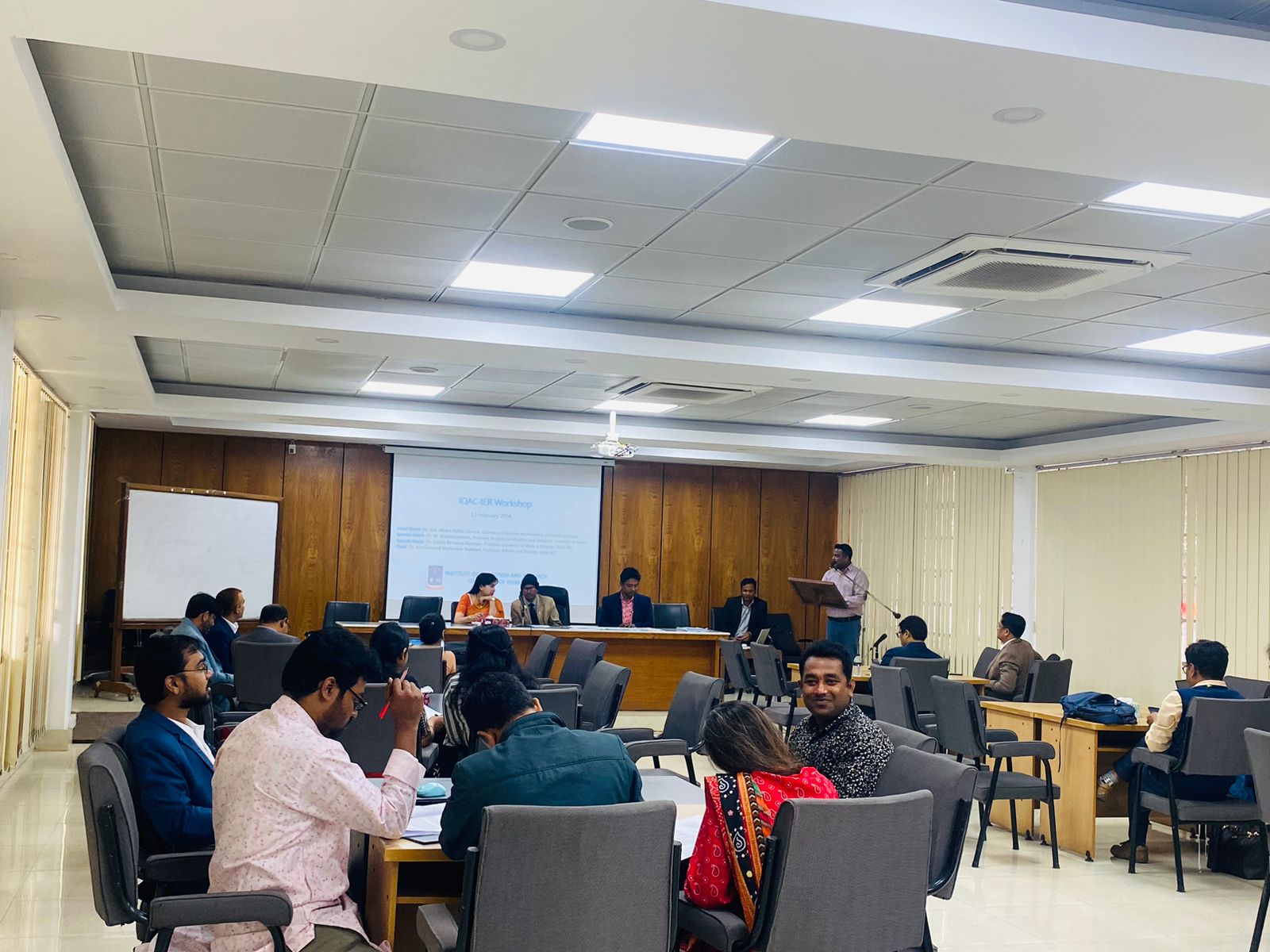
'Quality Assurance and Curriculum Reformation' Workshop held at IER, DU
University of Dhaka
Institute of Education and Research
IQAC-IER Workshop
Date: February 13, 2024
Venue: Dr. Md. Sadat Ali Conference Room (Room: 003)
|
Time |
Agenda/activities |
|
9:30 am |
Registration |
|
10:00 am 10:30am |
Inauguration Welcome speech: Dr. Mohammad Mahboob Morshed Associate Professor, IER-DU & Member IQAC-IER Speech by Special Guest: Dr. Sabita Rezwana Rahman Director, IQAC-DU Speech by Special Guest: Dr. M. Wahiduzzaman Professor, IER-DU Speech by Chief Guest: Dr. Md. Abdul Halim Director, IER-DU Speech and presentation by the Chair: Dr. Muhammed Mahbubur Rahman Professor, IER-DU and Chair, IQAC-IER |
|
10:30 am- 11:30 am |
Working Session 1:
Modality: Group work followed by presentation |
|
11:30 am- 1:00 pm |
Working Session 2:
Modality: Group work followed by presentation |
|
1:00 pm – 2:00 pm |
Lunch break |
|
2:00 pm –4:00 pm |
Short presentation: Iffat Naomee Assistant Professor, IER-DU & Member IQAC-IER Working session 3: Bachelor of Education (B.Ed. Honors) and Master of Education (M.Ed.) Curriculum Reformation
Modality: Group work followed by presentation |
|
Closing |
Summarization of findings: IQAC-IER team Thanksgiving and closing: Iffat Naomee |
Annex (Some key concepts to be considered)
Criterion 4-7: In case of Bachelor degree program curriculum includes minimum 25%of total credits for general education courses (GED) with clearly defined course learning outcomes and mapped with PLOs and learning outcome domains of BNQF. In case of Master’s degree program curriculum includes minimum 10%of total credits for general education courses with clearly defined course learning outcomes and mapped with PLOs and learning outcome domains of BNQF.
Credit Hour: Credit hour means for lecture, tutorial, seminar 1-hour face to face teaching per week for 14 weeks. For lab, studio or clinical work 1.5- hour face to face teaching per week for 14 weeks is equivalent to 1 credit. In case of industrial/workplace learning 2 hours per week for 14 is equivalent to 1 credit.
Learning Outcome Domains
i) Fundamental Domain: This domain involves the discipline specific knowledge and application of skills that a student obtains after a level of study, which influence his/her performance and societal contributions.
ii) Social Domain: This domain involves the skills needed for working with people at various levels to achieve set goals, communication and community engagement. The World Economic Forum categorizes social skills as the ability to coordinate, instruct, negotiate, persuade, be service oriented and have people and environment perceptiveness.
iii) Thinking Domain: Skills such as learning to learn, decision-making, problem solving and entrepreneurship are the elements Thinking Domain. This domain includes the ability of graduates to be active learners and critical thinkers. It requires the graduates to be investigative, enterprising, scientific, analytical and have management skills.
iv) Personal Domain: This domain includes skills such as life-long learning, self-direction, acting with integrity and the development of citizenship. Examples are the ability to be active listeners, manage one’s own time and the time of others, care for others, develop and build teams, be responsible for one’s own acts and results, perform civic duties and contribute to
society.